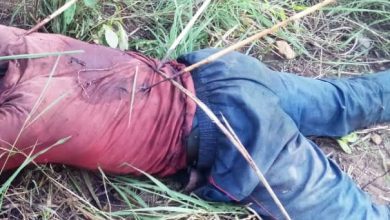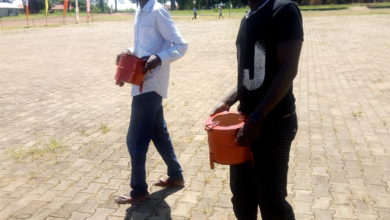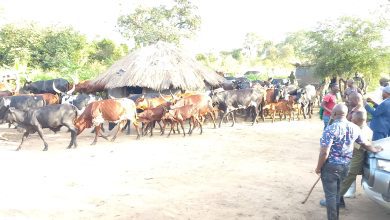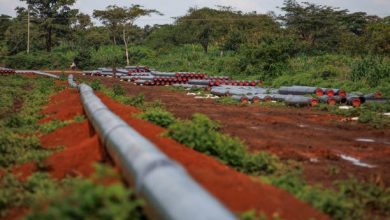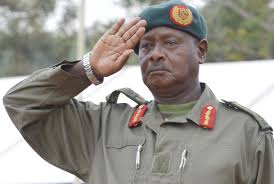
Global Politics
UGANDA: IS THE ICC STILL WELCOME IN UGANDA? MORE PETITIONS FROM UGANDA AS ONGWEN\S TRIAL CONTINUES
In the wake of Ongwen’s transfer to the ICC, two other petitions have emerged from Uganda asking the prosecution to investigate crimes allegedly committed by Museveni’s government.
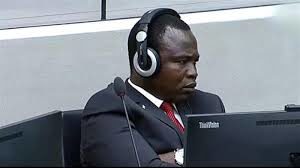
KAMPALA-UGNADA:Uganda’s main priority regarding the ICC remains the trial of Ongwen, which is currently ongoing at the court. Prosecutors have charged Ongwen with 70 counts of war crimes and crimes against humanity allegedly committed in the former IDP camps.
Lukode IDP camp still remain Gen. Ongwen’s case trial still remain a contested ICC trial, the question is who behind the massacred of Lukodi, Pajule, Odek, and Abok in northern Uganda. His trial, which began in 2016, is now in advanced stages, with the defense set to conclude presentation of evidence in December 2019.
Oyeng Yeng News produce to their esteems reader special report from the ICC, the Ongwen’s on going trial.
In the wake of Ongwen’s transfer to the ICC, two other petitions have emerged from Uganda asking the prosecution to investigate crimes allegedly committed by Museveni’s government.
In December 2016, a group of Ugandan parliamentarians drafted and submitted a petition to the ICC asking for an investigation into possible atrocities by government security forces. The petition called for the investigation of a November 2016 incident in which hundreds of heavily armed Ugandan army and police personnel stormed the palace of King Charles Wesley Mumbere, the cultural leader of the Rwenzururu Kingdom, located in Kasese District, Western Uganda. The raid resulted in the death of more than 100 civilians, including palace guards, women, and children. Hundreds more, including six youths, were arrested and charged with treason, terrorism, and murder.
The incident was the climax of a long-standing dispute between the Ugandan government and the Rwenzururu Kingdom. The petition called for the prosecution of President Museveni as the commander in chief of Uganda’s armed forces, Brigadier Peter Elwelu, who commanded military forces, and Asuman Mugyenyi, who commanded the police forces. The ICC acknowledged receipt of the petition, but there has been no response since then.
Another petition was launched in November 2019 by Uganda’s political opposition under an umbrella body referred to as the Citizens’ Rights Bureau. Among other issues, the petition “contends that General Yoweri Kaguta Museveni and a number of high ranking security and public officers… have committed heinous crimes and gross human rights violations categorized as crimes against humanity to the People of Uganda jointly and severally, for which he is liable to be subpoenaed, prosecuted, tried, convicted and punished by the International Criminal Court.”v
This second petition cites several alleged crimes, including suppression, torture, and extra-judicial killing of Ugandans; invasion of Parliament and desecration or abrogation of the national constitution; use of the state security apparatus and militia groups to persecute, dehumanize, and humiliate political opponents, members of civil society organizations, and the citizenry; enforced disappearances; and curtailment of civil liberties.
It seems unlikely that the ICC would be willing to open new and controversial investigations in the midst of Ongwen’s trial, especially at a time when investigations into the LRA’s situation in northern Uganda remain open. Matters are not helped by the fact that Uganda’s relationship with the ICC has been precarious over the last few years. The relationship has soured considerably since the referral of the situation in northern Uganda in 2005. Among other indicators of this decline in relations is that Uganda has joined the rest of the African Continent in riding the unpopularity wave against the ICC. Several African states, led by the African Union (AU), believe that the ICC is a biased institution focusing only on the prosecution of African leaders. This is demonstrated inter-alia by repeated demands from African states, including Uganda, that immunity should be granted for sitting heads of state.
Uganda’s president has been critical of the ICC in the last six years. At the swearing in ceremony of Kenyan President Uhuru Kenyatta on April 09, 2013, President Museveni referred to the ICC as an institution that was being abused by western powers to promote their agenda. The Ugandan government’s friendly relationship with former Sudanese president al-Bashir, who has been indicted by the ICC for war crimes, crimes against humanity, and genocide, is also concerning. Uganda even offered the former president asylum after being deposed following massive protests in Sudan.
Yet despite President Museveni’s open criticism on the international and diplomatic scene, Uganda continues to put on an impressive show of supporting the ICC. Most recently, at the Assembly of State Parties in The Hague last week, Uganda’s representative expressed [pdf] unequivocal support for the ICC by declaring a “firm commitment to the ideals for which the International Criminal Court was established.”
Despite these mixed messages, Uganda has cooperated with the court on Ongwen’s case, and this cooperation has been critical to the success his trial. For example, the government has provided useful evidence in the form of audio recordings and LRA radio communication intercepts.
However, if the ICC decided to look into allegations included in the recent petitions, it is difficult to predict how the Ugandan government would react. While Ongwen’s trial may not be affected, there is a risk that current open cases, such as the outstanding warrants against other LRA commanders, could stall. For this reason, it may not be such a negative outcome that the Ongwen case will continue to be the only focus of the ICC’s work in Uganda.
Lino Owor Ogora is a peace-building practitioner who has worked with victims of conflict in northern Uganda and South Sudan since 2006. He is also the Co-Founder of the Foundation for Justice and Development Initiatives (FJDI), a local Non-Government Organization based in Gulu District that works with children, youth, women and communities to promote justice, development and economic recovery in northern Uganda
This second petition cites several alleged crimes, including suppression, torture, and extra-judicial killing of Ugandans; invasion of Parliament and desecration or abrogation of the national constitution; use of the state security apparatus and militia groups to persecute, dehumanize, and humiliate political opponents, members of civil society organizations, and the citizenry; enforced disappearances; and curtailment of civil liberties.
It seems unlikely that the ICC would be willing to open new and controversial investigations in the midst of Ongwen’s trial, especially at a time when investigations into the LRA’s situation in northern Uganda remain open. Matters are not helped by the fact that Uganda’s relationship with the ICC has been precarious over the last few years. The relationship has soured considerably since the referral of the situation in northern Uganda in 2005. Among other indicators of this decline in relations is that Uganda has joined the rest of the African Continent in riding the unpopularity wave against the ICC. Several African states, led by the African Union (AU), believe that the ICC is a biased institution focusing only on the prosecution of African leaders. This is demonstrated inter-alia by repeated demands from African states, including Uganda, that immunity should be granted for sitting heads of state.
Uganda’s president has been critical of the ICC in the last six years. At the swearing in ceremony of Kenyan President Uhuru Kenyatta on April 09, 2013, President Museveni referred to the ICC as an institution that was being abused by western powers to promote their agenda. The Ugandan government’s friendly relationship with former Sudanese president al-Bashir, who has been indicted by the ICC for war crimes, crimes against humanity, and genocide, is also concerning. Uganda even offered the former president asylum after being deposed following massive protests in Sudan.
Yet despite President Museveni’s open criticism on the international and diplomatic scene, Uganda continues to put on an impressive show of supporting the ICC. Most recently, at the Assembly of State Parties in The Hague last week, Uganda’s representative expressed [pdf] unequivocal support for the ICC by declaring a “firm commitment to the ideals for which the International Criminal Court was established.”
Despite these mixed messages, Uganda has cooperated with the court on Ongwen’s case, and this cooperation has been critical to the success his trial. For example, the government has provided useful evidence in the form of audio recordings and LRA radio communication intercepts.
However, if the ICC decided to look into allegations included in the recent petitions, it is difficult to predict how the Ugandan government would react. While Ongwen’s trial may not be affected, there is a risk that current open cases, such as the outstanding warrants against other LRA commanders, could stall. For this reason, it may not be such a negative outcome that the Ongwen case will continue to be the only focus of the ICC’s work in Uganda.
Lino Owor Ogora is a peace-building practitioner who has worked with victims of conflict in northern Uganda and South Sudan since 2006. He is also the Co-Founder of the Foundation for Justice and Development Initiatives (FJDI), a local Non-Government Organization based in Gulu District that works with children, youth, women and communities to promote justice, development and economic recovery in northern Ugandav

